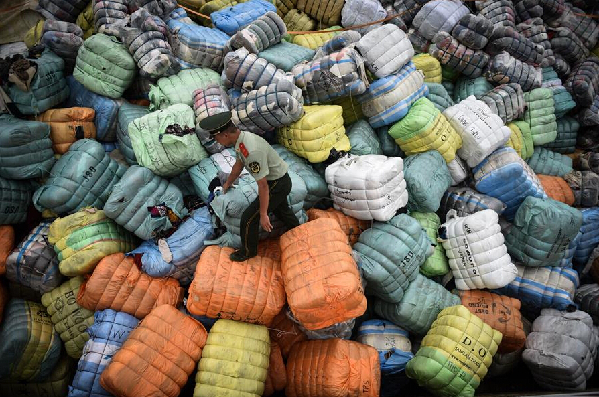Flow of garbage turns China into big landfill
- By Ni Tao
 0 Comment(s)
0 Comment(s) Print
Print E-mail Shanghai Daily, August 18, 2016
E-mail Shanghai Daily, August 18, 2016
|
|
|
A frontier police officer from Shenzhen in Guangdong Province walks on a hill piled up with smuggled used clothes on August 9. [Photo/Xinhua] |
Border police in southern China's Guangdong Province claimed recently that they had busted a gang suspected of smuggling antique clothes into the country.
In a raid in early June, police intercepted a ship en route to Shenzhen in choppy waters off the coast of the city of 11 million. Onboard the vessel, they came upon 549 tons of clothing tightly bundled in plastic wrappers. The stench emanating from this cargo suggested its dubious provenance.
In a revelation that generated many a macabre headline, police said the garments mainly came from mortuaries and landfills. This is the latest in a spate of incidents involving alleged smugglers who buy discarded clothes at bargain prices, transport them to China, and sell them at dozens, or even hundreds of times, their original prices.
Should these items slip past officials, they could have made their way to markets labeled as quality secondhand foreign goods — or worse, new ones. Little or no effort would be made to clean or disinfect them.
Filthy, foul-smelling and infested by disease-causing bacteria, these items pose a huge public health hazard. But that hazard has not received due attention, at least not from eager Chinese buyers who fawn over everything foreign.
We are accustomed to seeing trendy boutiques tout their merchandise as "real bargains" imported from abroad. Such phrases ought to be viewed with scrutiny in light of the reported police raids.
Apart from demonstrating how morally repugnant human behavior can be once it is consumed with avarice, the raid in Shenzhen also shines a spotlight on the notorious invasion of yang laji, or "foreign garbage."
This is actually a long-running issue deeply rooted in the irritating one-way traffic of global trash movement. It has become a cliche to say globalization has its winners and losers. Unfortunately, the boundaries separating winners and losers are not always so clear-cut. While emerging economies like China and India are sending jitters across Western business communities, in many ways they remain at the bottom of the pecking order as they become the dumping grounds for garbage from the developed world.
British media reported in 2012 that 420 tons of garbage produced that year by British households was bound for Asia, 70 percent of which ended up in Far Eastern countries including China.
A subsequent British government report indicated that 12 million tons of supposed "green" trash is shipped out of the country and dumped somewhere else per year. The threat foreign garbage poses to China is also highlighted in a prophesy made years ago by the United Nations, which said that by 2020 the number of discarded computers in China will have doubled or tripled from 2007, while junked handsets will have jumped seven-fold.
Throwaway culture
In fairness, much of China's trash misery cannot be solely blamed on foreign countries intent on getting rid of their own share of the trash problem. It is also a result of a consumerist society and the rise of a throwaway culture.
According to media reports, every year in China about 4 million fridges, 6 million washing machines, 5 million computers and television sets, as well as millions of mobile phones head to the dump as they approach the end of their designed lifespan.
To put China's trash habits in context, it's been said that three years' worth of electronic waste generated in Hangzhou, capital of Zhejiang Province, would be enough to fill the city's iconic West Lake.What's more, much has been made of the ecological consequences, such as heavy metal contamination, if these electronics are carelessly dumped.
Many Chinese cities are in danger of being surrounded by bulging landfills on their outskirts. Severely overwhelmed by domestic trash already, they are struggling to cope with an extra burden from the outside world.
There was a time when recycling garbage, especially that from abroad, made great economic sense. The most obvious example is a scavenger-turned-entrepreneur named Zhang Yin, who became China's richest woman in 2006 by importing used paper, cartons and other trash. But her aura dimmed dramatically as an environmentally-aware public blasted her business.
Criticism directed at Zhang, however, should not undercut our commitment to recycling garbage. Much of China's garbage goes unsorted. Barring financial incentives, it's difficult to get residents to willingly sort household garbage into different categories. Besides, confronted with thinning profit margins, many garbage recyclers are pulling out of the business.
While intensified police patrols might work temporarily to keep the worst foreign garbage at bay, what can we do about trash that keeps piling at home?






